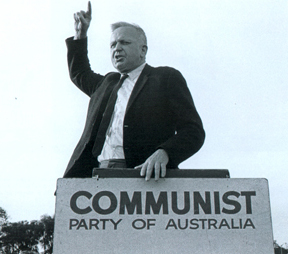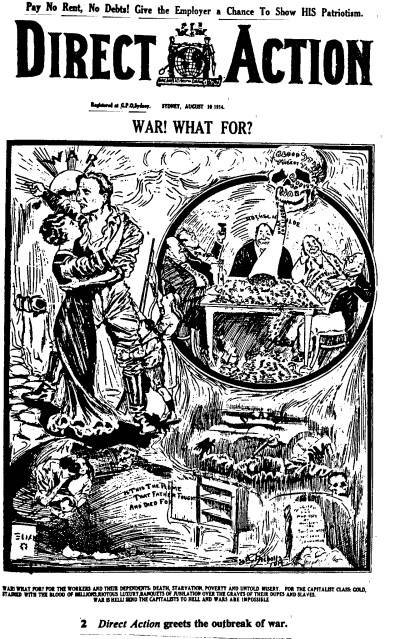Communist Party of Australia
Industrial action for peace: The Communist Party of Australia and antiwar activity before 1960
Jean Hale, 1912-2009 -- Farewell to a `most revered activist'
By Sylvia Hale
June 13, 2009 -- Jean Hale (nee Heathcote) was born on July 29, 1912, in Brisbane. Her grandfather, Wyndham Selfe Heathcote, was an Anglican clergyman who opposed the Boer War. His opposition to the Anglican Church's social policies and his opinions, such as this from one of his essays -– “The death of Jesus, as a social reformer using direct action, has been transmuted into the death of a God dying for the world” –- found him at loggerheads with the church and resulted in his leaving to become a Unitarian minister. His public speaking skills, which Jean inherited, were considerable. In October 1916 the Woman Voter reported that, “despite the large seating capacity of the building, thousands of people were turned away” from a debate between himself and Adela Pankhurst (the youngest member of the British suffragist family).
Australia: Towards a history of the Communist Party of Australia
[These articles were first published in Green Left Weekly in 1995 to mark the 75th anniversary of the founding of the Communist Party of Australia.]
By John Percy
September 27, 1995 -- Seventy-five years ago, under the impact and inspiration of the October 1917 Russian Revolution, the Communist Party of Australia was founded. It was a modest beginning, but an historic event. The CPA formed in 1920 finally dissolved in 1991, but for most of its life it was the dominant party on the left in Australia and an important force in the workers movement.
There are many
proud chapters in its history -- the numerous trade union struggles
led; organising the unemployed, women, Aborigines, young people;
important civil liberties fights; and solidarity with international
struggles, in Spain, Indonesia, Vietnam, South Africa and East Timor,
to name a few.
The CPA's founders had a vision of socialist
revolution in Australia, and this was the goal of most of its
rank-and-file members over the years. The party inspired dedication and
commitment from thousands of men and women, and organised the most
militant, idealistic, self-sacrificing section of the Australian
working class.
But it was also a history of mistakes, of betrayals, of lost opportunities.
To mark this important anniversary, Green Left Weekly will be carrying a series of articles on the history of the CPA.

By Dave Holmes
[This talk was presented at the A Century of Struggle — Laborism and the radical alternative: Lessons for today conference, held in Melbourne, Australia, on May 30, 2009. It was organised by Socialist Alliance and sponsored by Green Left Weekly, Australia’s leading socialist newspaper. To read other talks presented at the conference, click HERE.]
The Industrial Workers of the World in Australia: achievements and limitations

Lessons from the past: The Great Depression and the Communist Party of Australia

A section of the Wharfie's Mural, the large-scale work of art from the walls of the CPA-led Waterside Workers Federation (WWF) canteen in Sussex Street, Sydney, in the 1950s and '60s.
By Dave Holmes
[This is an excerpt from the new pamphlet, Meltdown! A socialist view of the capitalist crisis, by Resistance Books. Meltdown! features essays by John Bellamy Foster, Phil Hearse, Adam Hanieh, Lee Sustar and others. Purchase a copy from Resistance Books.]
The current economic crisis is a fundamental crisis of the world capitalist system. British socialist Phil Hearse calls it the “third slump” in the history of the capitalism (the other two being the Great Depression of the 1930s and the 1974-75 sharp downturn). And the levels of mass distress may yet come to rival the 1930s.
A history of the Australian Labor Party, 1890-1967
Conrick's History of the Australian Labor Party originally appeared in Direct Action (the precursor to Green Left Weekly), newspaper of the Socialist Workers League of Australia, between December 21, 1972, and June 14, 1973, and was published as a pamphlet by the Socialist Workers Party in 1979. The SWP is now the Democratic Socialist Perspective (DSP). This digital version was created by Ozleft. The pamphlet reflected the DSP's attitude towards the ALP at that time, however significant changes were introduced to this viewpoint in the 1980s. This document should be read in conjuction with The ALP and the Fight for Socialism. See also The ALP, the Nuclear Disarmament Party and the 1984 elections.
For a deeper analytical treatment of the social origins of social democracy in general and the ALP in particular, please consult Jonathan Strauss' series of Links articles on the concept of the labour aristocracy.
Socialists in the Australian women's liberation movement
To understand the development of feminism in Australia, it is useful to briefly recap the political situation that gave rise not only to the women's liberation movement, but to the whole range of social movements that sprang up in the late 1960s and early 1970s.
During the Second World War, women were drawn into many non-traditional areas of work, such as making ammunition and ships. These were much higher paid jobs than women were used to, and many women who did not previously work for pay experienced life as working mothers for the first time. There was some public child-care provision, and the ideology that women were incapable of metal work and similar trades conveniently disappeared as everyone was urged to “do their bit for the war effort and the boys at the front”.
When men began returning from the war in large numbers in 1945, women were forced to give up these jobs. It was the start of the “baby boom”: women were encouraged to have babies to repopulate. This was also the start of the economic boom of the 1950s.
Steps toward greater left unity in Australia
By Peter Boyle